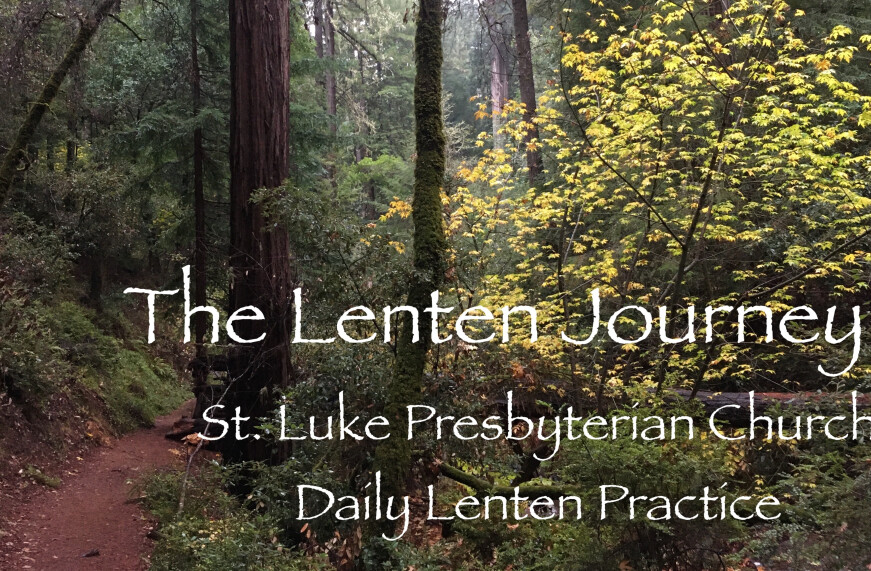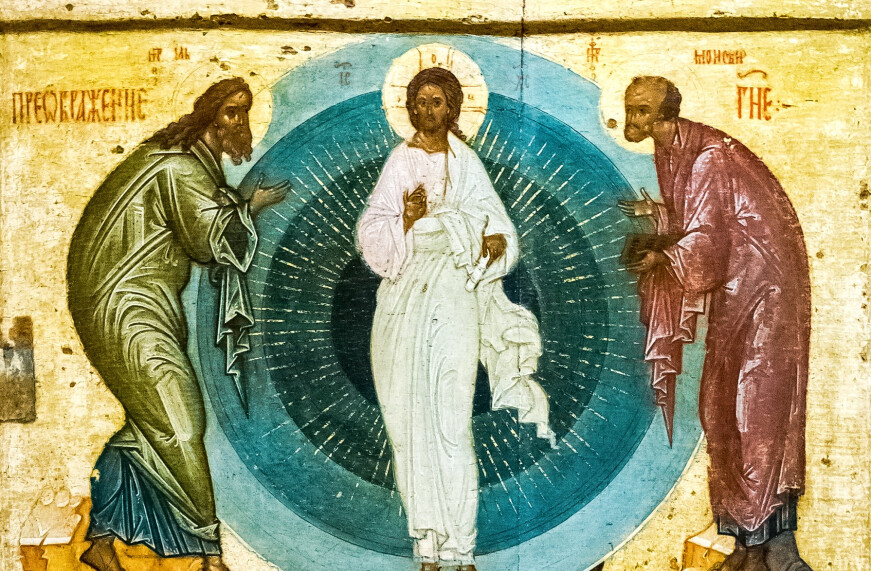Daily Lenten Practices

Spiritual and prayer practices expand our sense of what God is doing in us and in the world. During the forty days of Lent, you are invited to explore a variety of prayer and spiritual practices. You'll receive a new practice each day, Monday through Saturday. We omit Sundays because Sundays are "little Easters" - not part of Lent. Some of these practices will resonate with you. Others will not. That's okay.
Thursday, February 18: As you fall asleep, ask a question something like, “Where in this day did I feel truly myself? Where did I feel authentic? When did I sense joy in who I am and what I was doing?” This ancient Ignatian exercise is called the examen. Doing it over a period of time helps us discern what God might be calling us to do.
Friday, February 19: Take up journaling every morning: two or three pages about whatever comes to mind and whatever is on your heart. Do not edit, check your spelling, worry about grammar or go back and read what you’ve written, at least not for several days. Over time, note what topics keep showing up. A relationship? A job issue? A fear? A grudge? Why do you keep returning to this? What is God inviting you to do?
Saturday, February 20: If you don’t already do so, begin each meal with a simple grace or prayer of gratitude. Books of graces are available at the library and bookstores, if you’d rather not pray “freeform.”
Monday, February 22: Create an altar. Select a space in your home that you will see regularly, to remind you to take time to pray. Select “sacred” items to which you feel connected: objects from nature, photos, candles, stones. Be creative and playful. As you pass it each day, say a short prayer of intention that you might see the whole world as sacred as this altar.
Tuesday, February 23: Read through the Psalms, beginning with Psalm 1 and reading one a day through Psalm 150. Read with a sense of where the psalmist is speaking to you and your life.
Wednesday, February 24: Memorize part of a psalm to carry with you throughout the day, and throughout Lent. There are endless options but if you need a place to start: Psalm 46:10: “Be still and know that I am God.” Psalm 18:2: “The Lord is my rock, my fortress, and my deliverer, my God, my rock in whom I take refuge, my shield, and the horn of my salvation, my stronghold.” Psalm 100:1: “Make a joyful noise to the Lord, all the earth!” Psalm 139:14: “I praise you, for I am fearfully and wonderfully made. Wonderful are your works; that I know very well.”
Thursday, February 25: Try centering prayer, an ancient Christian form of prayer that looks like meditation but is done in the presence of God. The guidelines:
1. Choose a sacred word or a sacred breath as the symbol of your intention to consent to God’s presence and action within.
2. Sitting comfortably and with eyes closed, settle briefly and silently introduce the sacred word as the symbol of your consent to God’s presence and action within.
3. When engaged with your thoughts, return ever-so- gently to the sacred word. “Thoughts” include body sensations, feelings, images, and reflections.
4. At the end of the prayer period, remain in silence with eyes closed for a couple of minutes.
For more: See Thomas Keating, Open Mind, Open Heart, 20th anniversary edition (Bloomsbury: 2006)
Friday, February 26: Try reading a devotional or daily meditation book every morning. There are many good daily devotionals, including those produced by AA and Al-anon.
Saturday, February 27: Make a prayerful Lenten discipline of not using alcohol or drugs to the point of dulling your perception of judgment.
Monday, March 1: Give up meat on Mondays, holding the intention that the practice is a prayer for the planet (meat consumption is one of the biggest contributors to the average person’s carbon footprint, fueling climate change).
Tuesday, March 2: Meet (virtually or otherwise) with a group that nurtures your spiritual development. It might be a men’s or women’s group, a meditation group, a twelve-step group, or a Bible study group.
Tuesday, March 3: Try a “breath prayer.” Just a few options: 1) As you breathe in, pray silently, “Speak, Lord,” and as you breathe out, pray, “…your servant is listening.” 2) Breathe in, “My help comes through God;” breathe out, “who made heaven and earth.” 3) Breathe in, “Lord Jesus Christ;” breathe out, “…have mercy on us.” You can do this several times throughout the day, or for a longer period of time: for example, on a walk, while you fold laundry, at stop lights, waiting in line for your vaccine.
Thursday, March 4: When confronted with adversity, try praying, “Not my will, but thine.” The prayer acknowledges that there is something larger than our own ego, desire or intention and is an open admission that we are not in charge.
Friday, March 5: Create a sacred moment by noticing, truly seeing, your surroundings. You could do this outdoors, or in a beautiful place indoors; even, for example, in the produce section of the grocery store. Notice the play of light, the colors, the architecture, the textures. Remind yourself that God created what you see, and God loves it. Remember that Moses saw the burning bush only because he turned aside.
Saturday, March 6: Once a week, take a day free of obligations or work to rest, enjoy loved ones and friends, hobbies, a good book … whatever it is that renews or fulfills you. In other words, take a Sabbath.
Monday, March 8: Listen to a favorite piece of music with the intention of letting it speak to your heart. What is it saying? What might God be saying through it?
Tuesday, March 9: Take an online yoga class. Yoga is intended as a spiritual practice using the whole body and breath. Your body – whatever its shape or condition – is a gift from God. The spiritual aspect of yoga emphasizes the attainment of peace and clarity of mind. Doesn't everybody want a little more peace and clarity? God certainly wants them for you. Perfect posture or form is secondary.
Wednesday, March 10: Read a poem. Try reading a poem every day. What is the poet saying that touches your reality and your heart? How might God be trying to reach you through this poem? There are many, many good poets but if you are having trouble figuring out where to start, consider Rainer Maria Rilke, Walt Whitman, Mary Oliver, Wendell Berry, Jan Richardson, and David Whyte.
Thursday, March 11: Look at a family photo – your immediate family or your extended family. Recall each person with the intention of appreciating that person’s beauty and goodness, and with the intention of blessing them.
Friday, March 12: Practice a spirit of welcoming. Intentionally and prayerfully ask God to help you welcome what comes into your day today - the good and the not-so-good. This prayer practice helps minimize anxious reactivity, and is especially useful at times when we are being overwhelmed by an emotion in the midst of our daily activities. When we find that it is difficult if not impossible to let go of an emotion or state of being, instead, we can move deeper into that state. This is a way of accepting what is rather than trying to run away from it. We consent to the presence of God, of the sacred, and to this moment just as it is.
These are the steps of a classic welcoming the prayer:
1) Feel and sink into whatever you are experiencing in your body. Notice the sensation in your body of the emotion or state of being. Where is it? What does it feel like? Is it moving around? Are you tensing parts of your body or breathing differently than usual? Is it a familiar sensation? Try to be fully present to this sensation rather than pushing it away. You don’t need to analyze, explain, or even name the sensation, just notice it.
2) Welcome - Welcome whatever you are experiencing. Accept that your feelings are there and that you can just be the way you are without trying to change.
3) Let Go - When you are ready, say, “I let go of my desire for security, affection, and control and embrace this moment as it is." It's more or less acknowledging, "For right now, I am okay."
To welcome and let go is one of the most radically loving, healing, faith-filled gestures we can make in each moment of each day. It is an open-hearted embrace of all that is — in ourselves and in God's world.
Saturday, March 13: Saturday, March 13: Practice hospitality to the service people you encounter today. Notice the young man bagging your groceries. He has a life – hopes, dreams, fears. Treat him as a beloved child of God. Do this with the mail carrier, the FedEx driver, the clerk at Macy’s, the housekeeper, etc. Look them in the eye. Say thank you.
Monday, March 15: Practice mindfulness. "Mindfulness" means maintaining a moment-by-moment awareness of our thoughts, emotions, bodily sensations, and surrounding environment with openness and curiosity. Mindfulness can support and sustain you by helping you manage the stress of today’s world. Mindfulness has been shown to have a positive impact on stress, attention, and even relationships. The American Psychological Association research shows a range of benefits of mindfulness, including:
* stress reduction
* boosts to working memory
* focus
* less emotional reactivity
* more cognitive flexibility
* relationship satisfaction
Begin with a simple exercise of setting aside time each day to be intentionally quiet and present. It may be over a cup of tea. Notice the cup, the taste of the tea, the feel of the liquid, the light around you. It may be on a neighborhood walk. Notice the sound of your shoe hitting the sidewalk, the wind on your face, the way your knees bend with each step. Be in the moment. Notice. Notice what the moment tells you about the ways of God.
Tuesday, March 16: Whom do you need to forgive? It could be someone from your past, your present, or even yourself. Forgiveness takes time and hard work, and often is a lifelong task. It is best approached as a practice. Here are some basic steps of this practice, which are much easier to list and to read than to do:
1. Honesty with yourself about the conflict.
2. Recognize your anger or bitterness and express a desire to overcome it.
3. Summon a concern for the well-being of the other person as a child of God.
4. Recognize your own part in the conflict and that you, too, have needed forgiveness.
5. Commit to change whatever caused or perpetuates your conflicts
6. Confess your yearning for the possibility of reconciliation.
Wednesday, March 17: Go to a bead store, choose 3 to 5 beads (or more) that catch your eye, and twine or a strap on which to string them. Make a prayer bracelet, with each bead representing a concern or a person. Wear the bracelet and touch it throughout the day.
Thursday, March 18: Read Peggy McIntosh’s 1988 article, “White Privilege: Unpacking the Invisible Knapsack.” https://psychology.umbc.edu/files/2016/10/White-Privilege_McIntosh-1989.pdf Reflect prayerfully on your own privilege. What might God be saying to you?
Friday, March 19: Fast for a day as a means of paying greater attention to life: to what we do, and to the things that control us.
Saturday, March 20: Give up unnecessary electronics for a day. Or a week. Or longer. During the pandemic, we rely on technology to connect, but some technology distracts us from bigger priorities. You could give your family or loved ones the time you would normally give to video games, social media, TV, doom scrolling, etc.. Spend some time thinking about how you use technology. Besides work and connection, is it boredom? Habit? Escape?
Monday, March 22: As you fold the family laundry, say/think a quick prayer of blessing for the person whose clothing you are folding.
Tuesday, March 23: At a group or family meal, go around the table and invite each person to name one thing for which they are grateful at that moment.
Wednesday, March 24: Think about your favorite hymn. Reflect on these questions and write down your responses: What lyrics are meaningful to you? What about the tune do you find moving? Do you associate it with a particular time, place or person? Based on your favorite hymn, how do you see God? How do you see human life? What do you see as the purpose of the church? Sing or say the lyrics to the hymn as a prayer. If you don't have a favorite hymn, or aren't familiar with any hymns, try this with a favorite song, one you turn to again and again.
Thursday, March 25: Watch a film, either a documentary or a feature film, that someone has recommended to you as “inspiring” or “challenging.” Watch it prayerfully, with the intention of having your heart melted. Your pastor's favorite: “As It Is in Heaven.” Others suggestions: "Remember the Titans," "Mr Holland's Opus," "October Sky," "To Kill a Mockingbird," "Moana," "Strictly Ballroom," "Hidden Figures," "A League of Their Own," "Bend It Like Beckham," and there are many more. You're invited to contribute your own suggestions.
Friday, March 26: Create something: take photos, bake a pie, paint a watercolor or oil painting, build a tower of rocks, draw a pencil drawing of your hand, knit a prayer shawl, sew new curtains, paste together a collage, write a poem, plant a vegetable garden, prepare a gourmet meal … whatever you feel inclined to create. Creating anything is a type of meditation that is healing and life-enhancing. It increases self-awareness, centers us, and breaks us free from the chatter of the mind. Remind yourself that you are co-creating with God the Creator.
Saturday, March 27: For those in marriages or long term partnerships: Saturday, Make your marriage or partnership into a spiritual practice by being intentional about being a partner. The key is to be willing to stay involved and connected every single day. Every. Single. Day.
Monday, March 29: Read a book that gives you a window onto the world of the Other, with the intention of having God touch and transform your heart. Some options (and there are many more): Ta-Nehisi Coates, Between the World and Me; Ibram X. Kendi, Stamped from the Beginning: The Definitive History of Racist Ideas in America; Asma Gull Hasan, American Muslims: The New Generation; Debby Irving, Waking Up White ... And Finding Myself in the Story of Race; J. D. Vance, Hillbilly Elegy: A Memoir of a Family and Culture in Crisis; Matthew Desmond, Evicted: Poverty and Profit in the American City. Continue to read even when you are challenged.
Tuesday, March 30: If you have a hunch someone might be alone for dinner tonight, give that person a call and invite him or her to a Zoom dinner party or to a socially distant, outdoor dinner. The practice of making connections reinforces our awareness of how the spiritual, emotional, and mental aspects of our lives intersect and nourish each other. And it's just good for the soul to break bread together.
Wednesday, March 31: Make a practice of thinking about what you buy. Henry David Thoreau wrote, “The price of anything is the amount of life you pay for it.” Be intentional about asking, “Does this fit with who I am and what I want to become? Does this fit with who God is calling me to be?”
Good Friday, April 2: If you did not have a chance to attend either the Zoom Maundy Thursday service or the Zoom Good Friday service, or even if you did, read one or more of the Scripture passages describing the night before and the day off Jesus' crucifixion:
- Matthew 26:17-75, Chapter 27
- Mark 14:10-72, Chapter 15
- Luke Chapters 22 and 23
- John 13:1-38, Chapters 18 and 19
Read prayerfully, with an open heart.


